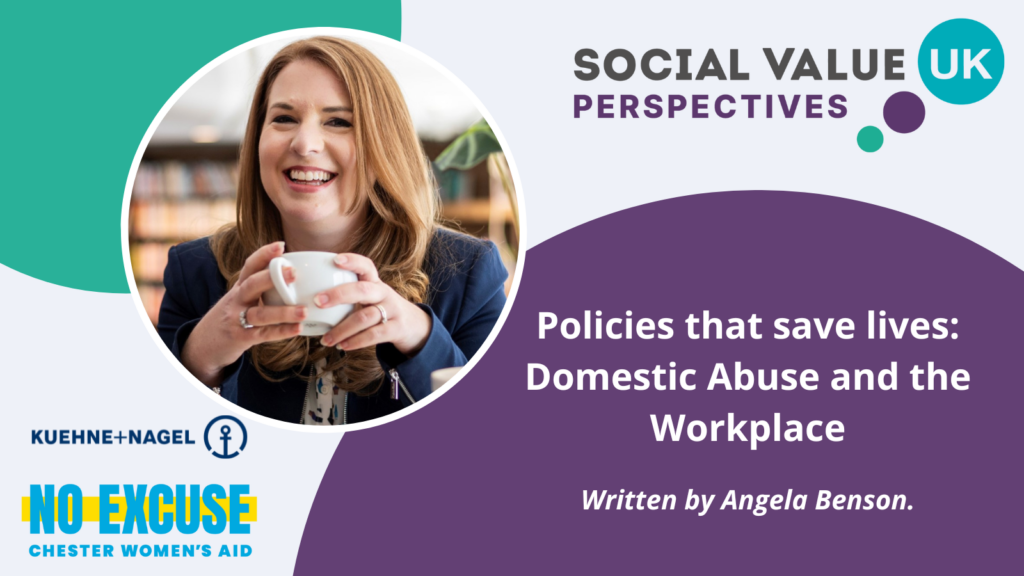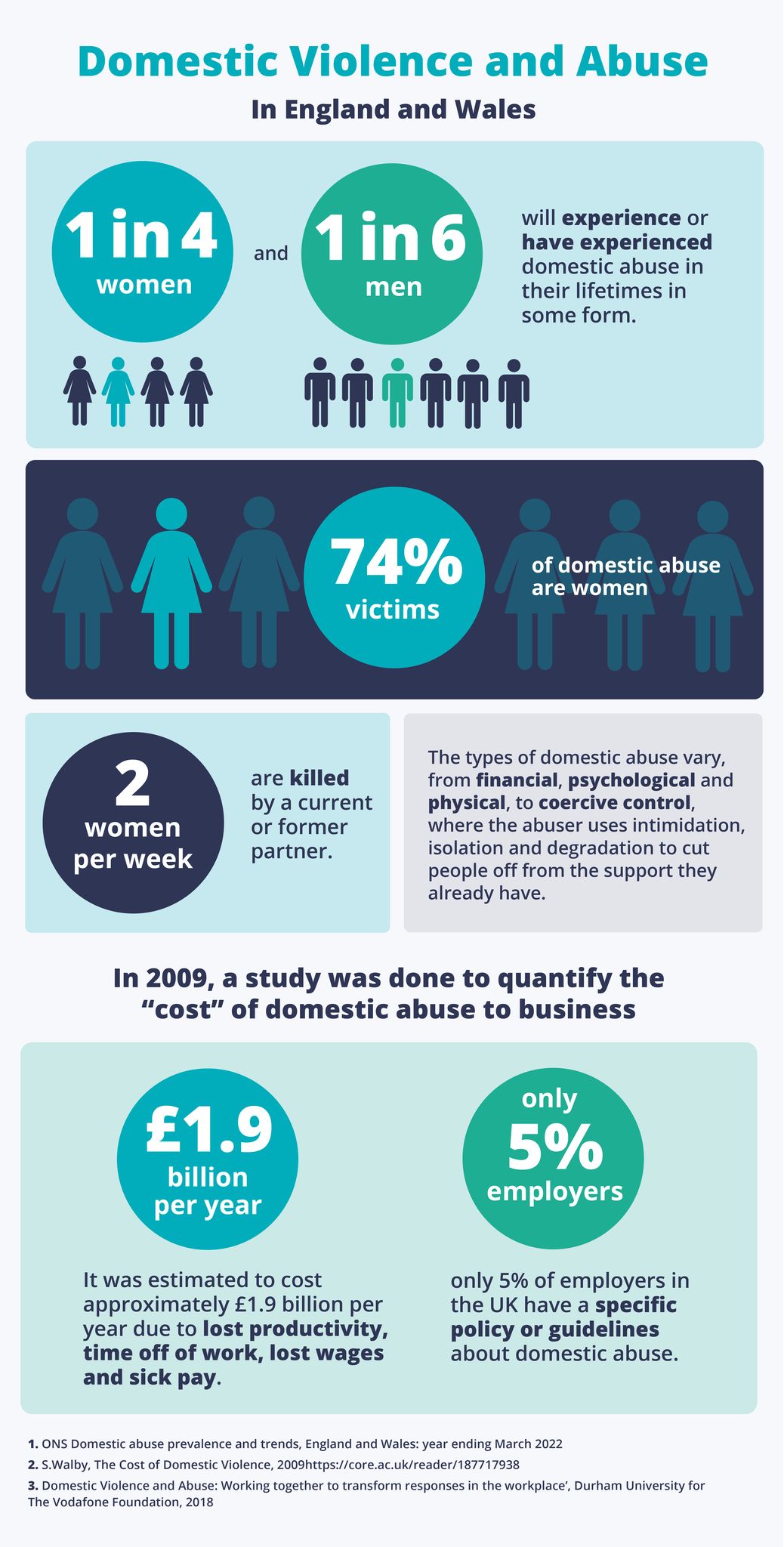
Posted 9th January 2023
Content Warning: this blog references personal experiences of domestic abuse. If you want more information or support with domestic abuse, please visit: https://refuge.org.uk/.
Can a workplace policy save a life? I know it can.
I’ve been volunteering as a trustee for the last eight years with Chester Women’s Aid, a small charity supporting victims of domestic abuse.
We give crisis grants to survivors at the point they flee an abusive situation or leave refuge to go into dispersed housing.
Over the years, we’ve seen patterns in the grant applications related to employment. For example, bus fare to get to and from work, extra cash to buy food because of unpaid time off, and even fees for GP referral letters for work.
My employer, the multinational logistics firm Kuehne+Nagel, has for the last four years placed a greater emphasis on health and wellbeing at work. It follows a worldwide shift in employment philosophy: employee wellbeing has proven to benefit the bottom line and must therefore be a critical part of any business strategy.
We began to talk about topics I had never heard discussed in the workplace in my professional life: cancer, neurodiversity, menopause, period poverty, death and grief, dyslexia, LGBTQ+ and minority experiences. It seemed almost no topic was off limits, but one was missing….domestic abuse.

In England and Wales alone, it is estimated 1 in 4 women and 1 in 6 men will experience or have experienced domestic abuse in some form, and 74% of all victims of domestic abuse are women.
Office for National Statistics data has shown two women are killed a week by a current or former partner.
The types of domestic abuse vary, from financial, psychological and physical, to coercive control where the abuser uses intimidation, isolation and degradation to cut people off from the support they already have – including their jobs.
In 2009, a study was done to quantify the “cost” of domestic abuse to business, and it was estimated £1.9 billion per year is lost due to worsened productivity in the form of time off, lost wages and sick pay.
In 2020 and 2021, there were several high-profile murders of women in their workplaces by their current or former partners. The horrific events prompted Chester Women’s Aid to develop a domestic abuse awareness training programme aimed at employers.
The training taught owners, directors, HR managers and Mental Health First Aiders within a company what domestic abuse was, its impact in the workplace, and how those experiencing it could be supported. We found out that simple actions, such as swift changing of bank details or company phone numbers and shift hours, as well as time off to manage moving house, court dates, and childcare, could provide critical support to someone leaving and recovering from an abusive situation, while maintaining their employment.
It seemed a “no brainer” – the victim could get on their feet, while the employer retained talent and productivity with reduced safety and damage risks.
With this knowledge, I approached my own employer, Kuehne+Nagel, about developing a policy and delivering the awareness training to our business. They were incredibly supportive, and together with a HR policy manager, we managed to develop, approve, and roll out the policy within a year.
The training soon followed and as we promoted the new initiative, we heard stories from our colleagues and managers of “a time when”.
A time when they were scared or hurt and didn’t feel they could tell their manager. A manager who didn’t know their employee was being abused and thought they were underperforming for other reasons.
We learned of an example where an employee had disclosed being in abusive situation to a director and how the latter has managed the situation through intuition, without any formal guidance or policy to rely on.
We came to learn the Quality, Safety, Health and Environment team had not considered domestic abuse as a risk to safety at work for victims and their colleagues.
These stories reinforced the necessity of the policy and training, and generated moving and important discussions in the business.
It hadn’t taken long to develop a policy and yet it had the power to save lives.
Our policy and training and had unearthed issues we didn’t know existed in our company, yet had always been there.
Only 5% of UK employers have a specific policy or set of guidelines for domestic abuse.
“I feel great satisfaction from the accomplishments in our charity and at my workplace, but I know we cannot stop there – there will always be new managers, new colleagues, and new developments to keep up with in terms of the policy.”
Remote working adds new complexity – what happens when the “safe space” in an office is no longer available?
These concerns drive me to raise awareness of the role that employers have in providing a safe and supportive workplace.
We employ human beings experiencing a range of issues over their lifetimes, so when so many of them may face domestic abuse, we need to be educated and ready.
A policy really can save a life.
This blog was written by Angela Benson, UK Commercial Bid Manager at Kuehne + Nagel
Angela has worked in logistics for 20 years. Her current role is Senior Commercial Proposal manager where she provides consultation to sales owners on bid strategy and writes responses articulating the Social, Commercial, and Operational value of Kuehne+Nagel’s services. In her spare time, she volunteers as a trustee Chair for Chester Women’s Aid, who raise awareness of domestic abuse and funds for victims. Originally from the United States, she has worked in Asia, Europe, and now calls the UK home, along with her husband and son.
Would you like to get involved…
To be contribute to our upcoming themes please contact Matthew Mckew, Advocacy Lead at Social Value UK. We are interested in hearing from both members and non-members.
Matt Eamer, founder of me&you said; “I’m excited that my creative agency can support Social Value UK in its mission to raise awareness and understanding of social value. We’ll be creating visuals and graphics to help bring Social Value Perspectives to life, making the themes accessible for new audiences.“
For media enquiries, please contact Isabelle Parasram OBE, CEO of Social Value UK, through our office by emailing [email protected]
Posted 9th January 2023

